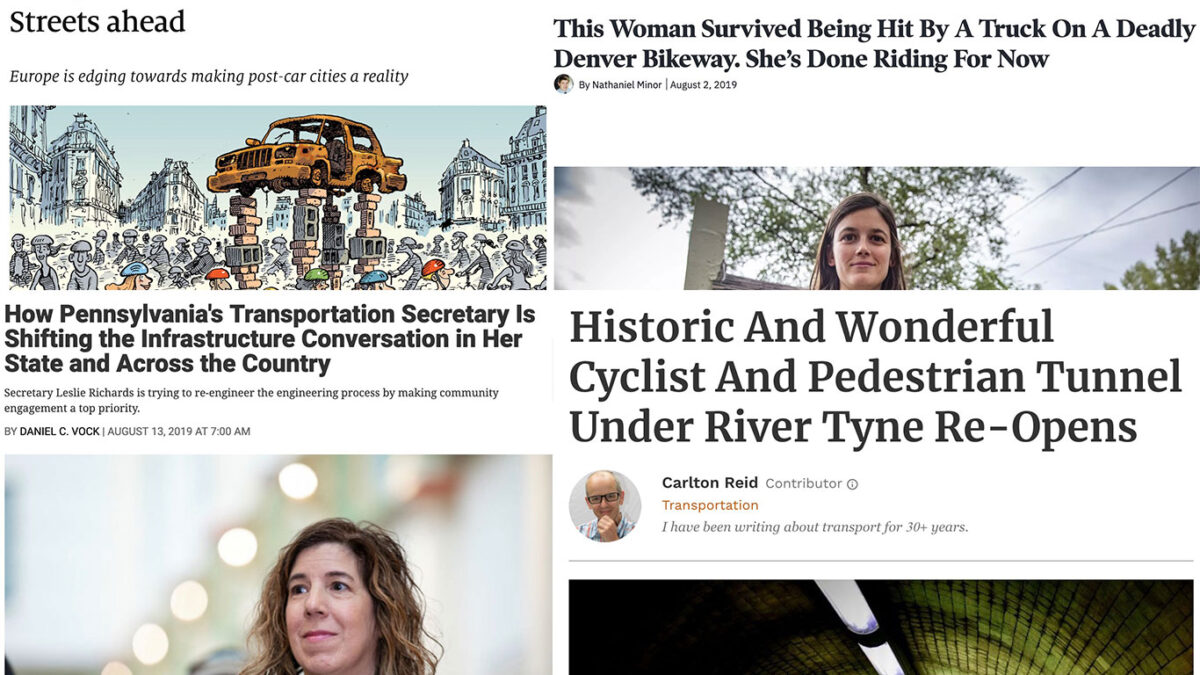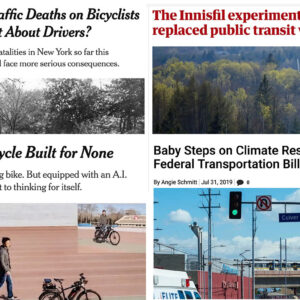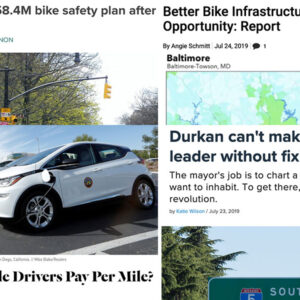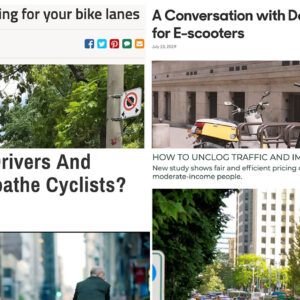This week’s Roundup is sponsored by the Portland Century, coming August 18th. Registration is open now!
I realize it’s Tuesday, but I was on the road all day yesterday and unable to get this week’s roundup together.
So without further adieu, here are the most noteworthy items we came across in the past seven seven days…
Pro cycling’s cultural problem: A guest writer for CyclingTips says too many fans of professional road cycling perpetuate the sport’s “weak culture” by giving former dopers a free pass.
Carfree cities get noticed: When something shows up in The Economist — as the idea of banning cars in cities did last week — you can rest assured it’s no longer just a cultural blip or passing fad.
Oregon’s climate change legislation: Two state legislators penned an op-ed in The Oregonian to explain why the policies in Oregon’s climate bill, HB 2020, are still worth fighting for. As a counterpoint, read the opinion of a 19-year-old who’s suing the State of Oregon for not going far enough.
Never satisfied: Even though it’s the best bicycling city in the world, Copenhagen is still pushing forward in an effort to get even more people to give up their cars.
PennDOT’s exciting leader: A woman from a planning background leads Pennsylvania’s DOT and her approach to transportation is what more states desperately need. Hopefully ODOT finds someone like Leslie Richards.
Advertisement
First cars, then bikes, then people: A plaza in Amsterdam used to be full of parked cars, then it became littered with parked bicycles. Now that an underground bike parking garage has opened, the plaza has finally reached its true potential.
Earn-a-bike: In the other Portland, immigrants can get a free bike after taking a few classes from a local nonprofit that teaches them how to ride.
TNC “confession”: CityLab broke down new data released by Uber and Lyft that demonstrates the impact these taxi companies have on congestion in major cities.
We need more protection: All around the country we are reading tragic stories like this one from Denver and we are coming to the same conclusion: Cities that encourage cycling must also discourage driving and provide physically protected space for people to ride in.
Carfree tunnel: Did you know there’s a tunnel just for walkers and rollers under the River Tyne in the U.K.?
Transit in Utah: An inspiring story of successful public transit in Utah where improved and free (in some locations) service has made bus service much more competitive with driving.
Video of the Week: Comedian Jim Gaffigan nails the absurdity of America’s dysfunctional romance with big SUVs:
https://www.youtube.com/watch?v=rb-cwquxLnY&feature=youtu.be
Tweet of the Week: In what feels like the transit riders’ equivalent of a human-protected bike lane, people in Seattle are taking over bus-only lanes and forcing car drivers to get out of them.
In an ode to the woman who went semi-viral over the weekend telling drivers to get out of the bus lane, a group is here at 6th and Olive flagging cars out of the bus lane and thanking bus drivers pic.twitter.com/UxUkq6BUGV
— Heidi Groover (@heidigroover) August 13, 2019
— Jonathan Maus: (503) 706-8804, @jonathan_maus on Twitter and jonathan@bikeportland.org
Never miss a story. Sign-up for the daily BP Headlines email.
BikePortland needs your support.








Thanks for reading.
BikePortland has served this community with independent community journalism since 2005. We rely on subscriptions from readers like you to survive. Your financial support is vital in keeping this valuable resource alive and well.
Please subscribe today to strengthen and expand our work.
Carfree Tunnel: I been to Newcastle UK a couple times. Of all the cities I’ve been to, it’s the one that physically most resembles Portland, with lots of interesting bridges over a navigable river port protected from the sea. It’s very hilly and a major railroad junction (which is why I stopped there in the first place.) It also has a subway, a castle keep (the “new” castle, circa 1100), and is at the eastern end of Hadrian’s Wall.
When we were debating a new bike crossing over the Willamette at Lake Oswego, I suggested a tunnel instead of a bridge, as the costs are often comparable (i.e. too much in any case). The fact that Newcastle and Glasgow have them means one can tunnel under a river from a steep embankment similar to LO.
From the article:
“There are other cycle and pedestrian tunnels in the U.K. – including under the Clyde in Glasgow and the Thames at Greenwich – but the Tyneside tunnels are of a much higher standard. Riding through the cyclists’ tunnel is a delight – there’s no wind, and from the Jarrow side there’s a curved descent.
“It’s likely the Tyne Pedestrian and Cyclist Tunnels were modelled on a similar tunnel system in Rotterdam in The Netherlands, built between 1937 and 1942. This connects the two banks of the River Nieuwe Maas and includes separate tunnels for pedestrians, cyclists and motorists.”
Odd for the Dutch to be taking up public works projects in some of that ’37-’42 range.
I also wonder how they keep these tunnels clean and safe. The Netherlands is (are?) wonderful, but no city is a Disneyland.
Actually, a lot of countries in Europe did many of their best projects just prior to WWII, as a way to get people back to works through government infrastructure projects during the Great Depression. The US has a lot of them, including WPA stonework on Rocky Mount.
As for maintenance, any piece of infrastructure that is used frequently all day every day is not only naturally regulated by its users, but becomes a political necessity to be maintained my the local municipality. The Hawthorne Bridge is crossed constantly, 24/7, so it’s a high priority for both the County (the owner) and the City to maintain it and patrol it. In contrast, many parts of the Springwater Path have virtually no users during parts of weekdays and at night, which encourages municipal neglect and vagrant camping.
These tunnels were heavily used once upon a time, but clearly became neglected by the 70s and no doubt became a bit like the Springwater. They are being restored because times have changed, again, and now they are a public priority.
And FWIW the Rotterdam tunnel is wonderful. I was there in 2013 and brought back a report and photos https://bikeportland.org/2013/06/06/in-rotterdam-a-peak-at-dutch-road-design-in-an-american-style-city-87873
The forethought to construct separate cycling and pedestrian tunnels of the Tyneside is key to its function. The single Greenwich and Woolwich tunnels under the Thames in London are actually officially pedestrian only by regulation of the local councils (you can take and walk your bike) due to poor behavior and conflicts during congested periods. Though when I used the Greenwich tunnel last month most cyclists ignored the “no cycling” signage seemingly without consequence. It actually wasn’t very busy so I walked my rental bike down to the low point in the middle, and then slowly rode at walking pace up the opposite incline without incident or conflict.
One thing with tunnels that adds to the complexity and cost overtime vs. a bridge is the need for lifts at either end which need expensive maintenance and if they break down the function of the crossing is severely impacted. Plus, while the almost 120 year old Greenwich tunnel was historically interesting, it wasn’t much to look at and there (and here) a beautiful bridge view is much more inspiring which adds to the value IMO.
If you are around a sport long enough, you’ll compete in a dark era.
If you survive that dark era, they call you a veteran.
Team leadership is hired from a pool of veterans.
If cycling has a “weak culture,” doesn’t every sport?
And for the disheartening video of the week: motoring journalist/entertainer Jeremy Clarkson pulling out every easily debunkable sad anti-cycling trope vs. cycling infrastructure in London (cycling WORSE for the environment vs. cars? Really?) Of course this is just the type of par for the course inflammatory thing he’s known for, so it’s surely to just get a rise despite the “plea” for civility at the end.
https://www.youtube.com/watch?v=xJZlhECK0Ps
I had the opportunity to rent a road bike and do 3 rides last month in London and found it an amazing experience actually. the separated infrastructure and bike boxes at the front of nearly all signalized intersections is very high quality and to my US experience, the drivers were on the whole much better behaved even in tricky complicated roundabouts and intersections. I just made sure to stay out of the blindspot of van and truck drivers (statistically by far the most dangerous things on London streets) and watched out for scooters and mopeds. The network of quiet back streets and connecting links was great and made London feel much more like a set of villages rather than a massive metropolis. Cycling even made the scale of the city seem more manageable, with only a few minutes needed to get from the West End past the City of London. Riding in a purpose built curb-separated lane along the Thames all the way from the Tower of London to Westminster and then past Green Park to Buckingham Palace and through Hyde Park will be a treasured lifelong cycling memory for me.
^ oops this one meant be in the main thread, not a reply.
Way back in the dark ages before the current bike infrastructure in London, 1999 to be exact, I had to bike from Paddington Station to Kings Cross. Aside from the right-versus-left issue, I needed to use Euston Road to get to my destination. It was packed with 3 lanes of traffic each way, but drivers were very tolerant of my friend and I as we biked along the gutter lane. I felt much more safe than I did in Portland (where I lived at the time).
Clarkson is an out-of-touch blowhard.
Clarkson pretty much defines the phrase “out-of-touch blowhard”.
This is also a historical mining region in England. In WW1, units from Northumberland had some of the best trenches. I’m sure the quality of their tunnel has an aspect of their regional pride.
Transit In Utah: Transit isn’t really free if universities are using student fees to subsidize student transit use, as many universities already do. And the federal grant to pay for 3 years of service means that taxpayers in Oregon (and the rest of the US) are subsidizing transit fares in Utah.
Technically nothing is free. My tax dollars are paying for a bunch of car infra that I will never drive on, never have a product driven on and will most likely hasten our demise via climate change. Against that backdrop, I’m happy to see some of my tax pennies go towards fareless transit anywhere in the nation.
I’m almost exclusively on foot, bike or, occasionally, train, but if I could direct my taxes with one of those penny drop games I’d push a whole lot of them to transit. Transit and those using it make everything better, imo. (Kind of like bikes.)
“Banning cars in cities” link leads to underground parking garage article.
Thanks Joel. Fixed it.
Pro cycling’s cultural problem: I’m glad that this is being brought up because it seems that the ban on media talking about doping has actually been more successful than the ban on doping itself. The major outlets have no policy towards this other than juvenile ways for commenters to shut the discussion down when it accidentally arises.
Of course NBC’s coverage of the tour already included Christian Vande Velde who awkwardly sat there as Bobke forcefully deployed his embargo on doping talk for several years now but this year NBC decided to rehabilitate Lance by having him comment through video feed during the tour. THIS was too much for me but I watched for the small chance that they would address the elephant in the room. They didn’t and my guess is that this opens the door for more Lance in future tour coverage which I find repugnant. I was also disappointed in Bobke for this but have to remember that both him and Phil are friends of Lance which is apparently spilling out into their professional lives. While NBC has treated the tour much better than ABC, that’s still not saying much. I think American fans deserve better.
Finally, I haven’t put time into this yet but will for next year and will kick this off here, has anyone found reliable daily english coverage of the tour beyond NBC? Thanks
We just had the best tour in years…
Who cares if Armstrong comments… he did not kill pro cycling for me, only for people who never cared about it until he came along…
Vande Velde and Horner were informative and entertaining.
I do not know what you watched…
I did enjoy this year’s tour. My comments were specific to the way NBC handled dopers and doping discussions.
I agree that Horner was a good addition to the crew and I value Velde’s commentary as well but Phil needs to retire. He’s good for adding flare that benefits French tourism and sometimes historical context for the race but as a race commentator, the guy’s done. They should put Voigt in the studio for some fireworks as well as expanding on actual race coverage.
But most of the entertainment came from the tour itself. I’m hoping that 2020 builds on this but I still think NBC can do better which is why I’m after options.
It is rather funny that the world had pretty much decided that Armstrong is the cause of all doping issues. Guys like Merckx tested positive 3 times and served multiple suspensions yet he is welcome at any race. Does anyone think that a racer could win a major race clean prior to the biological passport? If you do you probably think that NFL players get that big and fast by simply working out in the gym. Sadly in all sport the temptation to cheat is too big. Imagine you spent 10 years training to to an NFL player and you realize that your only chance to reach that next level is to take steroids and HGH? If you don’t you are done, if you do you have a chance to make $10 million a year. I can say that I would not do that but I’m not a 20 year old person from a poor neighborhood with no other good options. Cycling was dirty for many years but appears to be much cleaner now based on the much more subdued racing. You don’t see the stars killing it on every climb. They have to pick their time and even the best don’t attack until very late in the race.
My problem with Armstrong isn’t the doping. It’s that he’s an unrepentant a-hole who ruined people’s lives and careers.
There have also been pro riders who, even after successful careers, quit while they still had some good years ahead of them because of the doping culture–Frenchman Charly Mottet and the brother of some guy who posts a lot here come to mind. There was an icky phrase that popped up a few times in the 80’s and 90’s–“failing to fulfill their obligations as a professional.”
That tunnel is cool! Too bad we could never have anything nice like that in Portland, it would be taken over by the homeless.
Without further ado
ado:
a state of agitation or fuss, especially about something unimportant.
“this is much ado about almost nothing”
adieu:
French for “goodbye”
About PennDOT’s exciting leader:
Very nice to hear such progressive thoughts coming not just from mayors but also from a state DOT. However, some of her comments at the end made me laugh. She says that the progress her DOT is making comes from “that we have more diverse perspectives now making decisions,” namely “At PennDOT, for the first time ever, our senior team is gender-balanced.”
I have followed bike advocacy for many years, and there are many smart and dedicated men who have worked tirelessly to make transportation policy more progressive. Just off the top of my head: Earl Blumenauer, Jim Oberstar, Ray Lahood, Jeff Mapes, Donald Shoup, Todd Litman, Sam Adams, Aaron Naparstek, Doug Gordon, Mark Gorton, Clarence Eckerson, and many more I forget now. Sometimes people have even complained that bike advocacy is too male and too white!
The important thing is to abandon the idea that cars are king. The way to do this is to use our brains, and not overthink gender.
Could you fix that adieu? Anybody can make a mistake but that’s almost in the sportwriter category.
Regarding Utah, you know the SLC area is kind of like going to an AA meeting in a bar. Or maybe, eating a salad at Golden Coral? Meaning, Utah is rapidly highway and road building all over. They are dropping single family housing waaaaaaaay outside the core. Sure, there is some infill…and there is the train and light rail. But udot is working hard to kill that competition. I drive through there pretty often and hardly ever see a bike or lines for mass transit.
I delivered into a brand new industrial/warehouse area. Guess what, beautiful landscaping, beautiful street two lanes and wide…..
Zero…zero! Sidewalks OR BIKE LANES. so really, f u SLC for literally ignoring anyone who does anything but drive.
So please, let’s not give a pass to Utah. The republicans stronghold for driving and for taking billions from the feds for water reclamation.
Thanks for the reality check on SLC, Mark. Our country already has way too much suburban/exurban infrastructure of busy roads without even sidewalks. There needs to be a hard stop, with that kind of development forbidden everywhere in the country. No sidewalks on the access roads = no development, period.